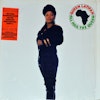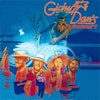When Ronald Reagan used the words “Welfare Queens” to describe the Black women he thought were hustling government money, Dana Owens was building her own political agenda. Her life in rap politics began the moment she crowned herself Latifah at the age of eight, after finding the title in a book of Arabic names and discovering it meant “delicate and kind.” By nineteen, Latifah and a lineup of star producers, DJs, and MCs collaborated to produce her 1989 debut album All Hail the Queen. Hip-hop heads were taken aback by what came from the cassette tape. Even with their ears to the speakers, people were hard-pressed to find anything “delicate and kind” about the level of skill found in the album’s beat curation. Latifah convinced golden-era aficionados that the meaning of words like “delicate” and “kind” needed to shift. Between Reagan and the male-dominated rap music landscape, All Hail the Queen cleared the space for a different kind of femininity.
Rap music is in the business of timestamping. Comb through its lyrical history and you’ll hear any given year shouted out on wax for the future archive. One of those years is 1988, and it is associated with hip-hop royalty. In ’88, NWA, Public Enemy, Slick Rick, Eric B & Rakim, and other giants released standout albums that epitomized what is now called the golden age; though not everyone agrees on who should be categorized as legends. One question that surrounds the lore of ’88 is who gets lost in the shadow cast over 1989. It was in 1989 when Dante Ross, a young A&R rep at Tommy Boy Records, caught wind of the Flavor Unit. He recalls meeting DJ Mark the 45 King at a club one night and the next thing he knew, Ross was in a dark corner listening to the music of a man who had headphones, just in case he had to shop his demo. Ross heard enough to be impressed. The next time the two connected was on a three-way call arranged by Fab 5 Freddy. That’s when 45 King played the song that sealed the deal—Latifah’s “Wrath of My Madness,” which prompted Ross to invite the Flavor Unit to the office to talk business. Upon hearing Latifah’s command on “Princess of the Posse” at the Tommy Boy Records headquarters, Dante Ross offered them a contract. Within a year, All Hail the Queen was released as a twelve-track album (and three bonus remixes), with supreme production and competitive lyrics.
Perhaps what makes All Hail the Queen one of the greatest albums in rap music history is how it models the marriage between the DJ and the MC. It’s a journey through the afterlife of samples. It highlights the trust we owe the DJs and selectors who used ’80s technology to repurpose the music they found in their parents’ record collections. Having released his own timeless classic, “The 900 Number,” in 1987, 45 King was one of the greats who demonstrated crate diggin’ as a research practice. On the song “A King and Queen Creation,” 45 King makes a rare appearance as an MC and drops lyrics that explain how All Hail the Queen was conceived, “Bringing a mixture / of pure flavor / I make beats / she rocked rhymes / so I gave her / a sample sound / then she added a compound.” And there you have it: the formula, which can’t be separated from the palpable confidence you hear in the album’s pace. The blending of the Flavor Unit with the Native Tongue family expanded the life of Latifah’s sound, placing her squarely between the two crews as a member. “Mama Gave Birth to the Soul Children,” produced by Prince Paul, featured De La Soul, who were Latifah’s labelmates and fellow members of the Class of 1989 of classic album debuts. The song is sandwiched between two other gems that hover around the typical four-on-the-floor tempo range, “Dance for Me,” and what Latifah describes as “hip-hop house/hip-hop jazz,” on the song “Come into my House.” Including hip-hop house was a bold decision, and yet she saw it through, creating evidence of the merging sounds and underground club scenes from New York to New Jersey.
KRS-One makes a cameo appearance on the “Evil that Men Do,” and his presence grants the project its diasporic feel. KRS-One and Latifah are two MCs who normalized reggae riddims as hip-hop instrumentals, and their collective catalogs speak to how Caribbean migration patterns brought the sound system to housing projects throughout New York City. The standout track that puts this transatlantic connection onstage, however, is “The Pros.” Produced by Daddy-O of Stetasonic, the song flirts with dub and settles in the one-drop as Latifah and Daddy-O root their warning to amateur MCs in call-and-response antics.
The anthemic “Ladies First” introduced a catch phrase to innercity feminism. U.K. rapper Monie Love stepped into the scene and made the role of women in the industry a worldwide affair. Other rappers such as MC Lyte, Antoinette, Roxanne Shanté, J.J. Fad, Oaktown's 3-5-7, Nikki D, Sweet Tee, and Ms. Melodie rode that spirit in between 1988 and 1989 and refused to be afterthoughts in hip-hop’s growing visibility. These weren’t just female MCs; these were peers on the M-I-C.
The mathematics on this album equals hip-hop royalty, and it’s been immortalized by everything Latifah has done as an artist between the ages of eight and fifty. If you had the chance to experience All Hail the Queen in real time, then you know that Latifah left behind a message for Reagan and any other sucka MCs: “You tried to be down / you can’t take the crown / maybe from someone else / but not me.”


